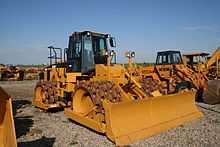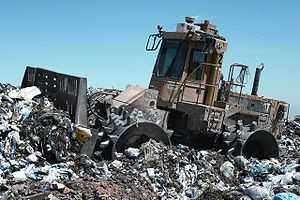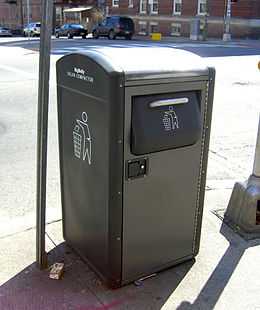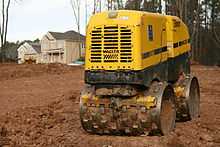Compactor

A compactor is a machine or mechanism used to reduce the size of waste material or soil through compaction. A trash compactor is often used by a home or business to reduce the volume of trash.
Normally powered by hydraulics, compactors take many shapes and sizes. In landfill sites for example, a large bulldozer with spiked wheels called a landfill compactor is used to drive over waste deposited by waste collection vehicles (WCVs).
WCVs themselves incorporate a compacting mechanism which is used to increase the payload of the vehicle and reduce the number of times it has to empty. This usually takes the form of hydraulically powered sliding plates which sweep out the collection hopper and compress the material into what has already been loaded.
Different compactors are used in scrap metal processing, the most familiar being the car crusher. Such devices can be of either the "pancake" type, where a scrap automobile is flattened by a huge descending hydraulically powered plate, or the baling press, where the automobile is compressed from several directions until it resembles a large cube.
Commercial use

Many retail and service businesses, such as fast food, restaurants, and hotels, use compactors to reduce the volume of non-recyclable waste as well as curb nuisance such as rodents and smell. In the hospitality industry tolerance for such nuisances is particularly low. These compactors typically come in electric and hydraulic operation, with quite a few loading configurations. Most popular loading configurations fall under the following:
- Ground-access;
- Walk-on;
- Secured indoor chute.
These compactors are almost exclusively of welded steel construction for two reasons: durability under pressure and exposure to the elements, as compactors are installed either completely outdoors or sometimes under a covered loading dock.
Residential use

There are also trash compactors, hydraulic or manual, designed for residential use. Likewise, they reduce the volume of garbage. For example, some compactors reduce the volume of polystyrene to 1/30.
Municipal use
In addition to the waste vehicle and landfill use, there are solar-powered trash compactors that can hold the equivalent of 200 gallons of trash before they need to be emptied..[1]
Construction industry
In construction, there are three main types of compactor: the plate, the "jumping jack" and the road roller. The roller type compactors are used for compacting crushed rock as the base layer underneath concrete or stone foundations or slabs. The plate compactor (vibratory rammer) has a large vibrating baseplate and is suited for creating a level grade, while the jumping jack compactor has a smaller foot. The jumping jack type is mainly used to compact the backfill in narrow trenches for water or gas supply pipes etc. Road rollers may also have vibrating rollers.
In England the name "wacker plate" or just "wacker" is commonly used to refer to plate compactors, derived from the name of Wacker Neuson, a well-known manufacturer of such devices. The name is pronounced in the English style as whacker as opposed to the correct German vacker. A "Jumping Jack" compactor is colloquially referred to as "Paddy's Motorbike", due to the traditional resource of Irish construction labourers, and the way that the operator appears to "ride" the hammer holding the handles like a motorcycle.
-

A small plate compactor
-
A jumping jack compactor
-

A trench roller operated by remote control for operator safety
-

Large roller "sheepsfoot" compactor for use on soil
Patents
- U.S. Patent 2,234,098 — Can crusher and baler — 1941
- U.S. Patent 7,145,450 — Compactor Service & Monitoring System — 2006
See also
References
- ↑ Solar Compactors Make Mincemeat of Trash, All Things Considered, NPR, July 17, 2007
External links
| Wikimedia Commons has media related to compactors. |
| Look up compactor in Wiktionary, the free dictionary. |
- Preventing Injuries When Working With Ride-On Roller/Compactors, a publication from the U.S. National Institute for Occupational Safety and Health
- Olympic Compactor Rental Group, a compactor rental company that provides compaction equipment for commercial and industrial trash and recyclables
